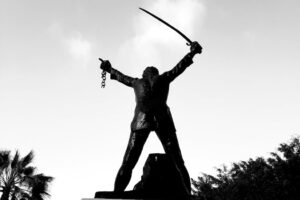TEXT: 1 Kings 19:19-21
God had told Elijah that He will choose a prophet in his stead. When eventually Elijah met Elisha, he “cast his mantle upon Him” as a symbol that God was calling Elisha. He recognized the import of Elijah’s dramatization. Elisha was a prosperous man, dutiful and tended well his business on the field with “twelve yoke of oxen”. When the call came to him, his response was prompt and immediate. “And he left the oxen, and ran after Elijah, and said, “Let me, I pray thee kiss my father and my mother and then I will follow thee”. He knew the urgency and the change that must occur in his life and only needed to go back home to inform his parents, lest they presume that some calamities had befallen him.Elijah’s method of revealing the call to Elisha was dramatic. He cast his mantle upon Elisha without uttering a single word. Even when he spoke later, it was bereft of any word of encouragement. “And he said unto him, Go back again: for what have I done to thee?” However, Elisha’s immediate action was a definite proof of his total yieldedness to God’s call. He burnt the instruments and killed the animals and finally bade his family farewell.
Many years ago, Alexander The Great faced a serious battle against a fierce, powerful enemy. The armies of the enemy camp outnumbered his. Alexander, a great commander and strategist, gave the order for his army to cross the bridge and proceed to battle. When his army had crossed the bridge, he blew it up (burnt the bridge). His soldiers knew that there was no way to go back. That strengthened their determination to go forward to win the battle. They had a resounding victory. What Elisha did has a striking similarity with Alexander’s burning of the bridge. He had reached a point of no-return and since the bridge had been ‘burnt’, what was ahead of him was nothing but victory.
Elisha had his hands on the plough and never wanted to look back to go back to the “instruments”. He was ready to go through thick and thin, rain and sunshine, difficulties and problems. So we too must be determined never to look back as we resolve to go all the way with the Lord Jesus Christ.
CHRIST’S CALL TO FOLLOW HIM.
1 Kings 19:19; Matthew 4:18-22; 11:28; Psalm 95:6-8; 2 Peter 3: 9; Isaiah 43: 7,21
The call of God is universal. As God called Elisha of old, so the Lord is calling everyone today . He expects us to respond immediately and not delay or resist His call upon our lives (1 Kings 19:19; Matthew 4:18-22). If you have been living in sin and the call of God to salvation comes to you, you need to repent and surrender your life entirely to Christ (Psalm 95:6-8).You must realize that this call is coming to you to prepare you for an everlasting life and to bestow spiritual blessings upon you (Matthew 11:28)
The people who are busy on legitimate service or vocation are usually the ones whom the call of God comes to. Moses was busy tending the flock of his father-in-law; Amos was occupied with fruit-picking; Peter and Andrew were busy fishing at the seashore; James and John were engaged in “mending their nets” and Matthew was sitting at the receipt of custom. Elisha, we find was busy with his secular employment. He was neither lazy nor idle, but gainfully employed.
We must also know that those who will be useful, happy, successful and victorious are those who respond immediately to the call of God. There are six areas God calls us to: (1) Repentance; (2) Salvation, peace and rest; (3) Fellowship; (4) Citizenship in the kingdom; (5) Service in the kingdom and (6) Separation from the world (2 Peter 3: 9; Isaiah 43: 7,21 ).
CONSECRATION AND CROSS-BEARING TO FOLLOW CHRIST
1 Kings 1920,21; Ruth 1:10, 14-17; 2 Samuel 15:15, 19-22; Psalm 15:4,Judges 11:29-35; Luke 9:57-62.
Elisha consecrated everything to obey the call of God. He responded willingly, promptly without doubting or questioning but with complete surrender and total abandonment to the call and will of God. He counted the cost. Elisha knew it was a call he must obey, even though he was going to stand against the tide and wind blowing in the nation of Israel. Elijah was not a popular national figure, but a despised and ridiculed prophet, hated in the King’s palace. Yet Elisha followed him, knowing that it was God’s call.
The church that preaches holiness and the totality of God’s word, has an uncompromising stand against sin, does not give undue emphasis on prosperity messages, but teaches on restitution of stolen properties or unscriptural marriages, will not be a popular church. Yet, it will take believers who are solid, sound, consecrated and committed to remain with such a church.
The language of someone who is following through with the Lord, is that he “sweareth to his own hurt and changeth not” (Psalm 15:4b). The Lord wants us to be like Jephthah who said, “I have opened my mouth unto the LORD, and I cannot go back” (Judges 11:35b). Jesus sums it all: “No man, having put his hand to the plough, looking back, is fit for the kingdom of God.”
CROWNS FOR DETERMINED PILGRIMS.
2 Kings 2:1-4,6,8,9,10,12-14;13:20,21; Isaiah 28:5; 2 Timothy 4:8; James 1:12; 1 Peter 5:4.
God is looking for determined pilgrims today, who will be resolutely committed to pray through, read the word of God through and serve the Lord till the very end. And where God can find such a man or woman, he will channel His grace, power, anointing and authority on such an individual.
How did God reward Elisha? His reward spanned his life, death and on to eternity. From the point he started to follow the Lord, he was crowned with power, authority, glory, anointing, revelation gifts of the Spirit, meaningful and useful ministry, respect of the whole nation, answers to prayers and miracles in his life and ministry. He had a double portion of the Spirit. In life and death, Elisha lived in the spirit of victor and blazed forth triumphantly. Just to mention a few: He smote the river Jordan and passed over on dry ground (2 Kings 22:8,14) multiplied food, spoke to kings, Gentiles and the children of Israel. Finally, he had a wonderful posthumous influence in raising the dead (2 Kings 13:20,21).
When you have burnt the bridge behind you, you will not be a double-minded man. You will not go back to the world. But you will be vested with the awesome power and anointing of God and your life will be a sweet song of victory and triumph.





Most Commented Posts